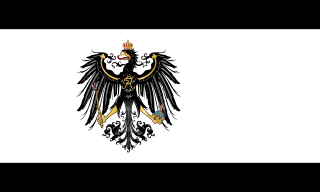
Hamm is a city in North Rhine-Westphalia, Germany. It is located in the northeastern part of the Ruhr area. As of 2016 its population was 179,397. The city is situated between the A1 motorway and A2 motorway. Hamm railway station is an important hub for rail transport and renowned for its distinctive station building.

Aachen Cathedral, traditionally called in English the Cathedral of Aix-la-Chapelle, is a Roman Catholic church in Aachen, western Germany, and the see of the Roman Catholic Diocese of Aachen.

Düren is a town in North Rhine-Westphalia, Germany, between Aachen and Cologne on the river Rur.

Demmin is a town in the Mecklenburgische Seenplatte district, Mecklenburg-Western Pomerania, Germany. It was the capital of the former district of Demmin.
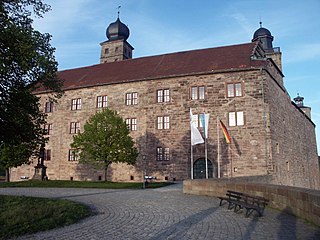
Kulmbach is the capital of the district of Kulmbach in Bavaria in Germany. The town is famous for Plassenburg Castle, which houses the largest tin soldier museum in the world, and for its famous sausages, or Bratwürste.
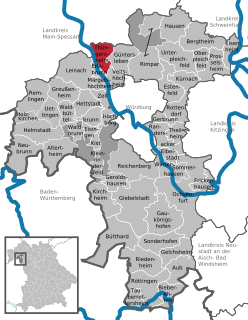
Thüngersheim is a community located in Germany. The community is situated on the River Main. It is a community in the district of Würzburg. The village is molded by the surrounding vineyards, more than 2 square kilometres (0.8 sq mi).

Feldkirch is a medieval city in the western Austrian state of Vorarlberg on the border with Switzerland and Liechtenstein. It is the administrative center of the district Feldkirch. After Dornbirn, it is the second largest town in Vorarlberg in terms of population, with slightly more inhabitants than the state capital Bregenz. The westernmost point in Austria lies in Feldkirch on the river Rhine, at the northern tripoint border of Austria, Switzerland, and Liechtenstein.

Erkelenz is a town in the Rhineland in western Germany that lies 15 kilometres southwest of Mönchengladbach on the northern edge of the Cologne Lowland, halfway between the Lower Rhine region and the Lower Meuse. It is a medium-sized town and the largest in the district of Heinsberg in North Rhine-Westphalia.
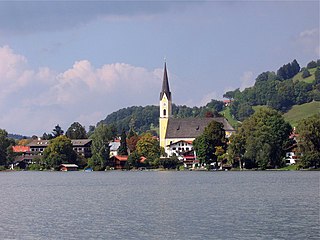
Schliersee is a small town (Markt) and a municipality in the district of Miesbach in Bavaria in Germany. It is named after the nearby Lake Schliersee. It comprises the districts Schliersee (town), Westenhofen, Neuhaus, Fischhausen, Josefsthal and Spitzingsee.

Korntal-Münchingen is a town in the district of Ludwigsburg, Baden-Württemberg, Germany. It is situated at the northwestern border of Stuttgart and 8 km of its centre, and 10 km southwest of Ludwigsburg. Korntal was begun in the 19th Century when King Wilhelm of Württemberg permitted a group of Württemberg Pietists to erect a settlement based on the settlement congregations of the Herrnhuter Bruedergemeine or Moravian Church.
Jakob Dautzenberg was a German politician, member of the Communist Party of Germany, and resistance fighter against the Nazis. He was a member of the German Parliament during the Weimar Republic.

Laurensberg is a community and district of Aachen, Germany.

Brand is a district of Aachen, Germany, with about 18,000 residents. The district lies in the southern part of Aachen and borders Kornelimünster/Walheim, Forst, Oberforstbach und Eilendorf, as well as the city of Stolberg.

Eilendorf is a district of Aachen, Germany, that has around 15000 inhabitants. The communities of Eilendorf and Nirm share a border with the other Aachen districts of Brand, Aachen-Mitte, and Haaren, as well as the district of Atsch in Stolberg.

Kornelimünster/Walheim is the southern-most district of Aachen, Germany, and borders the Eifel area of North Rhine-Westphalia, as well as Belgium. It became part of Aachen in 1972, after all of the communities surrounding the city were reorganized administratively. The countryside is called Münsterländchen.
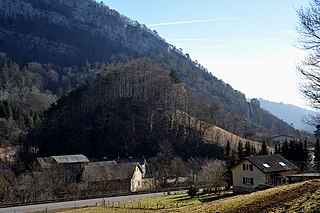
Péry-La Heutte is a municipality in the Jura bernois administrative district in the canton of Bern in Switzerland. It is located in the French-speaking Bernese Jura. On 1 January 2015 the former municipalities of Péry and La Heutte merged to form the new municipality of Péry-La Heutte.

Rheindahlen is a town in the western and largest borough of the city of Mönchengladbach in the German state of North Rhine-Westphalia. Since the reorganisation of Monchengladbach's boroughs (Stadtbezirke) on 22 October 2009 Rheindahlen has been part of Mönchengladbach West. From the granting of Nideggen town rights in 1354 until the incorporation of the mayoralty of Rheindahlen into M.-Gladbach on 30 June 1921, the place was an independent town.







